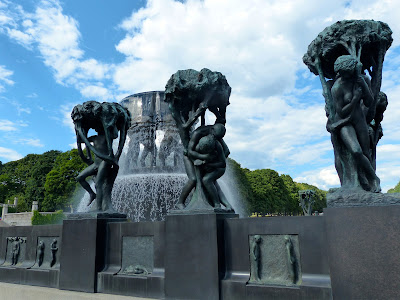We began our visit to Norway in Oslo, and started by visiting the
Royal Palace. Apparently the flag flying just means the
Royal Family is in the country but - unlike the UK - not necessarily in the palace at that time.
 |
| Norwegian Royal Palace in Oslo |
 |
| one of the palace guards |
 |
| another palace guard (female), next to the guard house |
 |
| Bust of Edvard Munch on top of his gravestone |
 |
| The Scream by Edvard Munch in the National Gallery |
After lunch we paid a visit to the 17th-century
Oslo Cathedral, and then the
Opera House, which sits on the edge of Oslo fjord and was designed to ressemble a glacier (the image is probably more effective in winter; we were there on a very hot summer's day!)
 |
| Interior of Oslo Domkirke |
 |
| Oslo Opera House (Operahuset) |
 |
| Oslo Opera House seen from further away |
Later in the afternoon we headed to
Frogner Park, to see the world's largest permanent
sculpture installation made by a single artist,
Gustav Vigeland. Altogether there are 212 sculptures in granite, bronze, or wrought iron. The Fountain is surrounded by 20 'trees' and 60 reliefs, all representing the eternal life cycle of mankind.
 |
| The Fountain |
The monolith itself has 121 interwrithed figures, and is surrounded by 36 figure groups that portray the cycle of life.
 |
| The monolith |
 |
| Close-up of the monolith |
 |
| Wrought iron gates, looking across the fountain to the main gate |
The Bridge forms a 100m-long, 15m-wide connection between the Main Gate and the Fountain, and is lined with 58 sculptures, including the well-known 'Angry Boy' or 'Little Hot-Head' (Sinnataggen).
 |
| Sinnataggen |
 |
| 'Between the Clock and the Bed': a self-portrait in the Munch-museet |
 |
| the child part of Damien Hirst's 'Mother and Child (Divided)' work |
In the afternoon we visited the
Nobel Peace Center, one of my favourite museums of all those we visited in Oslo. It serves as a showcase for the
Nobel Peace Prize and the ideals it represents. In the Nobel Field room all laureates are presented on their own screen, surrounded by a thousand small lights; every 15 minutes all screens show the same name and a recording of that prize winner's voice is heard.
 |
| The Nobel Field in the Nobels Fredssenter |
We ended our second day by visiting
Oslo City Hall, which was built in the 1930s and 40s and completed in 1950 to mark Oslo's 900th anniversary. The Nobel Peace Prize ceremony takes place every December in the Main Hall.
 |
| Oslo City Hall (Oslo rådhus) seen from outside |
 |
| Main Hall of Oslo rådhus |
On our final full day in Oslo we took a ferry west across Oslo fjord to the
Bygdøy peninsula which is home to five national museums. We started with the impressive
Viking Ship Museum which exhibits three viking ships, two of which are the best-preserved such ships in the world.
 |
| The Oseberg ship in the Vikingskipshuset |
Our next stop was the nearby
Norwegian Museum of Cultural History, a large part of which is open-air as it houses 160 historic buildings that have been relocated from elsewhere in the country. The museum was first established in 1894.
 |
Living history: a modern day teacher and children participating in an
educational programme at the Norsk Folkemuseum, dressed in 19th clothes |
One of the museum's most significant buildings is the early 13th-century
Gol stave church, which was brought to
Bygdø in 1885 and restored.
Stave churches are medieval wooden church structures, and are among the oldest surviving wooden buildings on earth.
 |
| Gol stave church at Norsk Folkemuseum |
Our final museum of the day was the
Fram Museum: "home of the world's strongest polar vessel". It tells the story of Norwegian polar exploration, and centres mainly on the original exploration ship
Fram that was used in expeditions of the Arctic and Antarctic between 1893 and 1912. It is though to have sailed further north (85°57'N) and further south (78°41'S) than any other wooden ship.
 |
| The vessel Fram at the Fram Museum |
The next day we left for the rest of our trip to Norway (Bergen & the Fjords; Tromso and the Far North) but we spent 24 hours in Oslo at the end of our trip before continuing our travels. We had time to visit the
Ekebergparken Sculpture Park in south-east Oslo where 39 artworks are on display, including pieces by Salvador Dali, Botero, Renoir, and Rodin.
 |
| 'Daphne in the Fall' by Kirsten Kokkin? |
I was particularly amused by two things in Oslo: the number of hairdressers' shops, and these heated dog kennels outside a restaurant.
 |
| heated dog kennels for you to leave your pet while eating at a restaurant |
 |
| one of the many hairdressers in Norway! |
See also:






























No comments:
Post a Comment